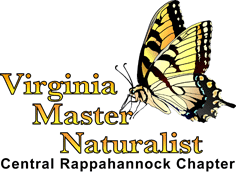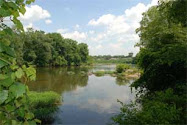Announcements:
Next Board meeting 2/7 @ Wegman’s 7pm (open to all members)
Next Chapter
meeting 2/19 @ church 7pm
Master Naturalist Volunteer Opportunities:
- Dahlgren has asked that an Earth Day education outreach take place on April 22 at the elementary school on base. It will be from 1-3pm. Volunteers needed.
- Spotsylvania Courthouse Trash Pick Up February 9th - Meet at Gazebo 9AM.
- Earth Day at Old Mill Park on April 27, rain or shine - volunteers needed
- Earth Day at AP Hill on April 18 volunteers needed
- Widewater St Park looking for volunteers for monthly cleanups- 1st Sat in February next opportunity
- Mott's Nature Center Volunteer Orientation - March 9th - 9-11am. Register with Alexa at Fredericksburg Parks and Rec.
- April 13 Osprey Festival @ Caledon. Opportunities to volunteer to give talking points/lead bird walk, native plant information, backyard habitat. Chapter can have a booth there. Caledon is coordinating event with Joyce from Colonial Beach.
Continuing Education:
- Owl Prowl @ Caledon 1/26 @ 7:00 pm. There is space for 21 people on the wagon.** Bring a blanket and some hot cocoa to share. Arrive a little bit early. THIS EVENT IS FULL
- Bluebird program @ Stratford 1/26 10-noon. Doors will be open at 9am. There will be a bag lunch about 12:30. Some walking is anticipated, so bring your walking stick. This is a FREE program.
- Dinosaur Beach walk @ Stratford in February. Date & time and to be determined. More details will be given at a later date.
- Vernal Pool field training to happen in February. Harry would like to lengthen time of monitoring. Breeding time for Spotted Salamander is Feb/March. Usually, the time to go investigate is at night, when peepers are peeping. Harry will send out a “Hey, it’s tonight! Let’s go look!” email, so have your gear at the ready. A lead monitor is desired for the Lee Drive vernal pools
- Montpelier has revamped programs. There will be programs twice/month. The first walk will focus on the Working Woods. The second walk will have a specialized focus. Walks will take place in April, June, August, and October. Native plants will be the specialized focus on April 24. A mushroom walk will be in June. The Chief Horticulturist at Montpelier will have training for those interested in leading the Working Woods walks.
- FOR Wild & Scenic Film Festival March 23 @ UMW. More information on FOR website https://www.riverfriends.org/events/





